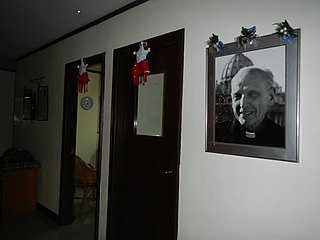A Quote by Meister Eckhart
A free mind is one which is untroubled and unfettered by anything, which has not bound its best part to any particular manner of being or worship and which does not seek its own interest in anything but is always immersed in God's most precious will. . . . There is no work which men and women can perform, however small, which does not draw from this its power and strength.
Related Quotes
One's own free unfettered choice, one's own caprice-however wild it may be, one's own fancy worked up at times to frenzy-is that very "most advantageous advantage" which we have overlooked, which comes under no classification and against which all systems and theories are continually being shattered to atoms... [an]will attain his object-that is, convince himself he is a man and not a piano-key!
Cast not away your confidence because God defers his performances. That which does not come in your time, will be hastened in his time, which is always the more convenient season. God will work when he pleases, how he pleases, and by what means he pleases. He is not bound to keep our time, but he will perform his work, honor our faith, and reward them that diligently seek him.
One's own free and unfettered volition, one's own caprice, however wild, one's own fancy, inflamed sometimes to the point of madness - that is the one best and greatest good, which is never taken into consideration because it cannot fit into any classification and the omission of which sends all systems and theories to the devil.
Today our (Society of Jesus) prime educational objective must be to form men (and women) for others; men (and women) who will live not for themselves but for God and his Christ - for the God-man who lived and died for all the world; men (and women) who cannot even conceive of love of God which does not include love for the least of their neighbors; men (and women) completely convinced that love of God which does not issue in justice for others is a farce.
By all means attend to your duties. Action, in which you are not emotionally involved and which is beneficial and does not cause suffering will not bind you. You may be engaged in several directions and work with enormous zest, yet remain inwardly free and quiet, with a mirror like mind, which reflects all, without being affected.
Everyone has in him something divine, something his own, a chance of perfection and strength in however small a sphere which God offers him to take or refuse. The task is to find it, develop it & use it. The chief aim of education should be to help the growing soul to draw out that in itself which is best and make it perfect for a noble use.
It is the interest of every man to live as much at his ease as he can; and if his emoluments are to be precisely the same, whether he does or does not perform some very laborious duty, it is certainly his interest, at least as interest is vulgarly understood, either to neglect it altogether, or, if he is subject to some authority which will not suffer him to do this, to perform it in as careless and slovenly a manner as that authority will permit.
A painting is an object which has an emphatic frontal surface. On such a surface, I paint a black band which does not recede, a color band which does not obtrude, a white square or rectangle which does not move back or forth, to or fro, or up or down; there is also a painted white exterior frame band which is edged round the edge to the black. Every part is painted and contiguous to its neighbor; no part is above or below any other part. There is no hierarchy. There is no ambiguity. There is no illusion. There is no space or interval (time).
There is a mortifying experience in particular, which does not fail to wreak itself also in the general history; I mean "the foolish face of praise," the forced smile which we put on in company where we do not feel at ease, in answer to conversation which does not interest us. The muscles, not spontaneously moved but moved, by a low usurping wilfulness, grow tight about the outline of the face, with the most disagreeable sensation.
Buddhas have a strength which is not of this world. Their strength is totally of love... Like a rose flower or a dewdrop. Their strength is very fragile, vulnerable. Their strength is the strength of life not of death. Their power is not of that which kills; their power is of that which creates. Their power is not of violence, aggression; their power is that of compassion.
And yet we have what purports, or professes, or is claimed, to be a contract—the Constitution—made eighty years ago, by men who are now all dead, and who never had any power to bind us, but which (it is claimed) has nevertheless bound three generations of men, consisting of many millions, and which (it is claimed) will be binding upon all the millions that are to come; but which nobody ever signed, sealed, delivered, witnessed, or acknowledged; and which few persons, compared with the whole number that are claimed to be bound by it, have ever read, or even seen, or ever will read, or see.
Thirdly, the supreme power cannot take from any man any part of his property without his own consent: for the preservation of property being the end of government, and that for which men enter into society, it necessarily supposes and requires, that the people should have property, without which they must be supposed to lose that, by entering into society, which was the end for which they entered into it; too gross an absurdity for any man to own.






































